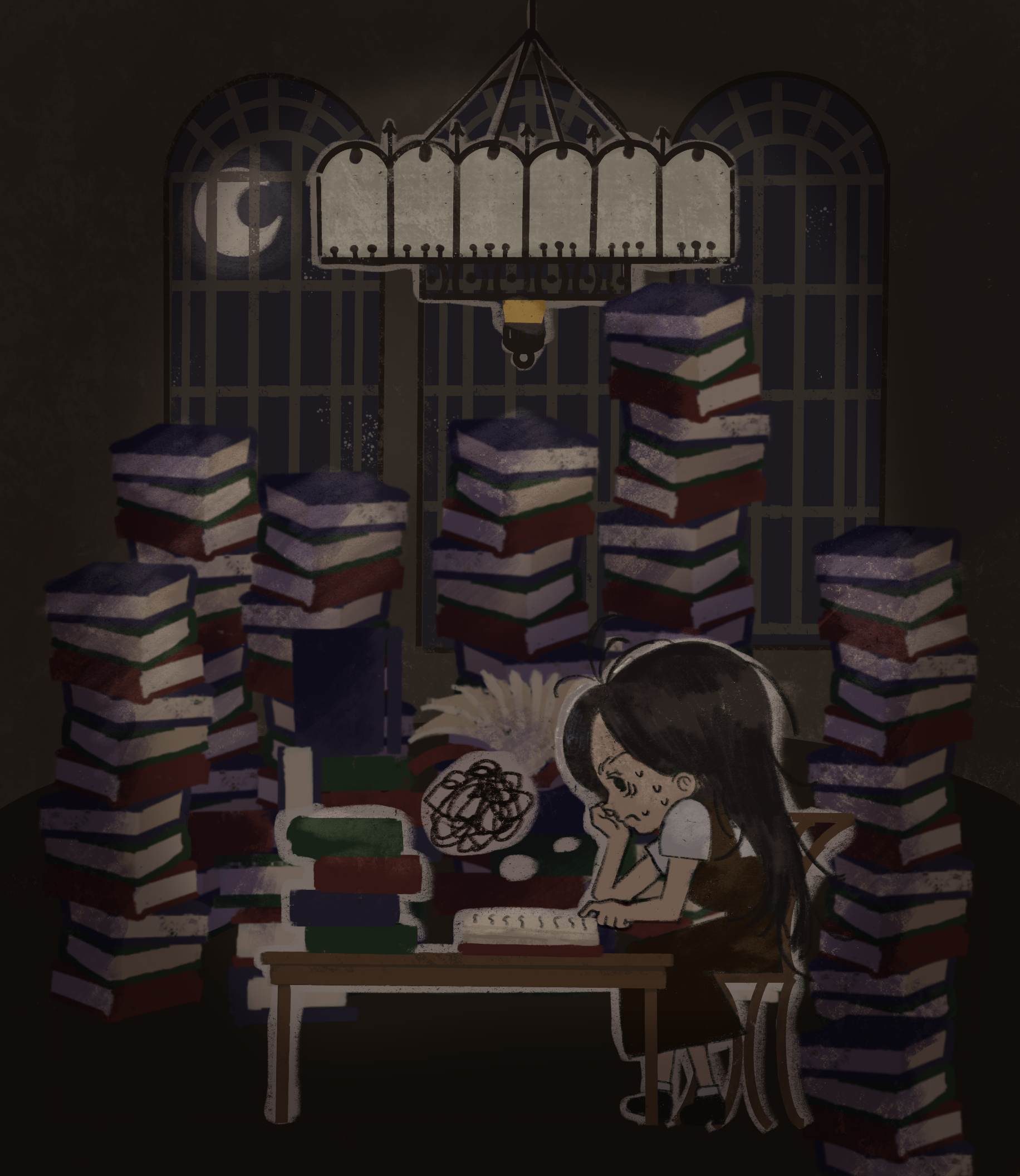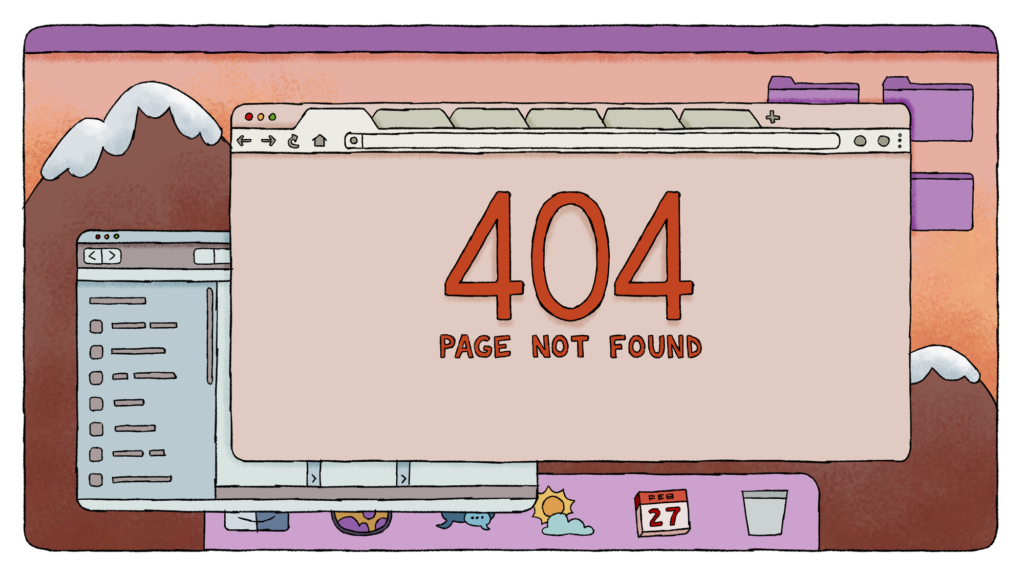404 Not Found: Challenging loneliness, finding personal meaning in research

(Maleeha Zaman/Daily Bruin)
By Ashley Leung
Jan. 30, 2022 11:42 p.m.
“404 Not Found” is a series by Ashley Leung, an Opinion columnist studying education studies and English. These columns will explore personal experiences of students and professors who have juggled the triumphs and frustrations of academic research. As research often warrants endless questioning and reflection, this series seeks to unveil, if not alleviate, the existential dread of researchers and academics in both humanities and STEM fields as they inevitably attach themselves to the value and significance of their work. Under the assumption that there will always be unanswerable academic and personal questions, readers are encouraged to nurture their self-worth as they navigate through college and beyond.
Research is lonely.
The word “research” could mean scientists in goggles and white lab coats peering into microscopes. It could also mean surveys, interviews and control groups or shoveling dirt and cleaning fossils. For me, it means fumbling through stacks of books from Powell Library and Charles E. Young Research Library, re-re-rereading theory-dense, paragraph-long sentences.
I call research lonely because professors have told me so, warning a group of us undergraduate English students eagerly concocting research projects that we thought would change the world.
I call it lonely because I am now near the end of my project, and the experience has been nothing but lonely.
I often ask myself why I find it so forlorn. After all, reading had always been my favorite hobby – the most peaceful way to discover the world and its people.
When I first discovered it in the likes of “Junie B. Jones” and “Matilda,” I felt all the corners of my fourth grade mind expand with images, vocabulary and meaning.
Meaning – that’s what I’d lost.
Now sitting here, smugly pursuing a degree in English, I overlook the covert disapproval of my industrious immigrant parents, the patronizing inquiries (“What exactly will you do?”) of my STEM-oriented friends, the depreciation of the teaching career I want to pursue and the pressures of a capitalist and materialistic society to not only earn enough to support myself but also earn enough to flex Instagram-worthy luxuries.
Well, I’d like to overlook them. Instead, I think about them daily. Even telling myself, “Kim, there’s people that are dying,” in Kourtney Kardashian’s voice doesn’t save me from the egocentric magnification of my trivial struggles.
It doesn’t help that droves of people on social media say English students either become teachers or baristas, as if neither deserve a higher pay. All of Reddit is a slap in the face.
Entering UCLA, I didn’t know what branch of English literature I would end up loving. Shakespeare? And feed into the English major stereotype? Austen? Love her, but I’ve strained myself applying 19th-century middle-class English romance to the current social context. Melville? And commit to a lifetime of whale metaphors?
Then, I found it: I discovered ethnic literature. More astonishingly, Asian American literature.
I had read “The Joy Luck Club” by Amy Tan in high school and loved it enough to do my current research project and honors thesis on it, but the concept of an English student studying anything other than the work of dead, or occasionally alive, white writers had flown right over my head until my second year at UCLA.
Granted, I love all of the aforementioned writers, but I felt a tinge of disconnection as an Asian American. I couldn’t see myself dedicating the rest of my life to reading or teaching the work of these white writers. On the other hand, Asian American literature has sought to answer questions of immigration, identity and generational trauma that I subconsciously ached to understand.
But if I loved my topic so much, if I loved reading so much, why did I find it lonely?
One night, during a three-hour-long research seminar, the whole class spilled our fears to the professor. We spoke about the daunting task of writing a 60-page paper, the insignificance of our research, the dire conditions of the academic job market and the detachment we felt from the outside world as we pored over book after book. I felt so heard, so understood and so united with these other undergraduates experiencing the same crises.
Then, I stood up, stretched, sat back down to work on my thesis, and the loneliness seeped right back in.
I realized then and there that I wasn’t only doing what I loved. Rather, I was doing what I loved while desperately trying to ignore outside voices that had gradually infiltrated my love of my work.
Grade school me would’ve dreamed of being surrounded by nothing but walls and walls of books. I had envisioned adulthood to be sipping instant hot chocolate, buying fancy bookmarks, reading all day and lodging in my enclosed library.
But grade school me didn’t have to worry about my future. She didn’t know what was considered a high-paying job. A $5 reward for washing dishes sufficed as my annual income.
I can never go back to that time of innocence and carefreeness.
To cope with my loneliness, I could reach out to scholars in the same field of interest. I could treat research like a 9-to-5 office job and forget about it after hours. I can host rant sessions with my fellow colleagues.
But in the end, as I write and as I read, and as I overthink, I am ultimately alone with my knowledge, my ignorance and my muddled thoughts.
And if there is no choice but to push through the present, to reload and reload our academic and existential questions just to be met with “404 Not Found,” then I suppose I’ll have to do just that.
I don’t have to earn a place for myself in this world.
As many dead ends as there are, I can still find meaning in my work even when others deem it meaningless. I can embrace solitude and share what is shareable.
These are reminders I will keep close to heart, and I hope you will too.



